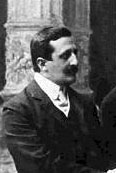Graça Aranha
| Graça Aranha | |
|---|---|

Graça Aranha in Rome, 1904
|
|
| Born | José Pereira da Graça Aranha 21 June 1868 São Luís, Maranhão, Brazil |
| Died | 26 January 1931 (aged 62) Rio de Janeiro City, Brazil |
| Occupation | novelist, diplomat |
| Nationality | Brazilian |
| Ethnicity | White |
| Alma mater | Faculdade de Direito do Recife |
| Literary movement | Modernism |
| Notable works | Canaã |
José Pereira da Graça Aranha (June 21, 1868 – January 26, 1931) was a Brazilian writer and diplomat, considered to be a forerunner of the Modernism in Brazil. He was also one of the organizers of the Brazilian Modern Art Week of 1922.
He founded and occupied the 38th chair of the Brazilian Academy of Letters from 1897 until his death in 1931. However, he would break all his relations with the Academy in 1924, accusing it of being "old-fashioned".
Graça Aranha was born in São Luís, to a rich and cultured family, son of journalist Temístocles da Silva Maciel Aranha and Maria da Glória da Graça. He was a prodigy, having completed his secondary studies when 13 years old, and went to study Law in Recife. He graduated with honours in 1886 and travelled to the South to work. He became a judge in Porto do Cachoeiro, a village in the backlands of the state of Espírito Santo. This experience was used by him in one of his best known novels, Canaã, a great editorial success in 1902. The novel explored the conflicts of the Brazilian immigrants. According to author Raymond Leslie Williams:
Without having published any books, Graça Aranha was invited to be one of the 40 founding members of the Brazilian Academy of Letter in 1897, by Machado de Assis, Joaquim Nabuco and Lúcio de Mendonça.
In 1900, he was admitted to the Foreign Service as a career diplomat. He worked as such for the next 20 years. While he was stationed in Paris, France, he wrote another success in 1911, the theater drama Malazarte. He retired as a diplomat in 1919 and returned to Brazil in 1921.
Graça Aranha sponsored modernism in the letters and arts and had several personality clashes with the traditionalists at the Academy, headed by writer Coelho Neto. He allied himself to other budding modernists of São Paulo and organized the revolutionary Week of Modern Art in February 1922. He opened the week under booing of an hostile audience, with a conference titled "The aesthetic emotion in modern art".
...
Wikipedia
